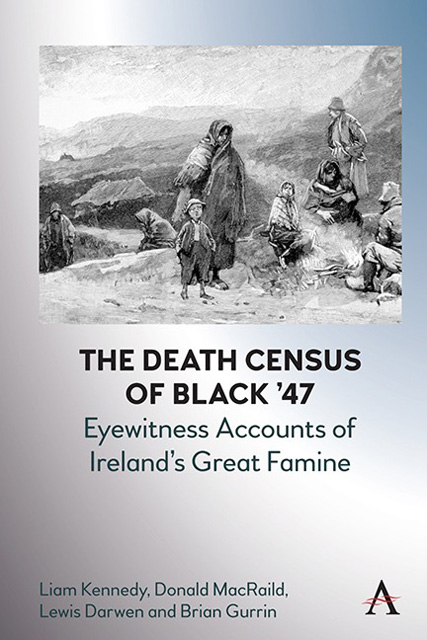Chapter One - The Great Famine
Published online by Cambridge University Press: 17 October 2023
Summary
The population of this parish at the commencement of last year was nearly 12,000; it is now reduced to 9,860 persons – 478 died of famine and its immediate consequences since 1 October 1846. There are at present 138 families suffering from fever. The great bulk of the people hold very little land, which is of inferior quality; it barely supplied potatoes in past years, and now that the potato crop is gone the poor are in the greatest distress. I find that 129 families were obliged to desert their little holdings and cabins. There are at present 470 families, consisting of 2,246 persons, in extreme want, living on turnips and a little Indian meal; no language can describe the miserable condition of most of them …
No private charities can meet the crisis. If the government do not give immediate and extensive employment the people will be lost.
Denis Tighe, Parish Priest, Ballaghaderrin, 1847Prelude
It was the summer of 1845, the weather not very different from the usual pattern of intermittent rain, sunshine and seasonal temperatures. Thoughts were turning naturally enough towards prospects for the harvest, the vital bounty of grain and potatoes that sustained the Irish people. The signs were good and expectations high after some poor harvests earlier in the decade. Beyond the horizon but unknown to the eight and a half million inhabitants of the island, invading forces, this time in the biosphere, were gathering strength. Two years earlier, a mysterious disease had ravaged potato crops in North America. From there, transatlantic traffic carried the disease to Europe. Geography was no barrier. By the early summer of 1845, the infection had reached Belgium and some other parts of continental Europe. With remarkable rapidity, the disease crossed the Channel. By August 1845, it was debilitating potato crops in the south of England. The following month, it had reached several parts of eastern Ireland. From Waterford and Wexford, there were alarming newspaper reports of a pestilence, as yet unnamed, attacking the potato fields. The nauseous stench of decay marked the progress of the disease. The leaves on potato stalks were turning black and the infection was spreading in all directions.
- Type
- Chapter
- Information
- The Death Census of Black '47Eyewitness Accounts of Ireland's Great Famine, pp. 3 - 28Publisher: Anthem PressPrint publication year: 2023



